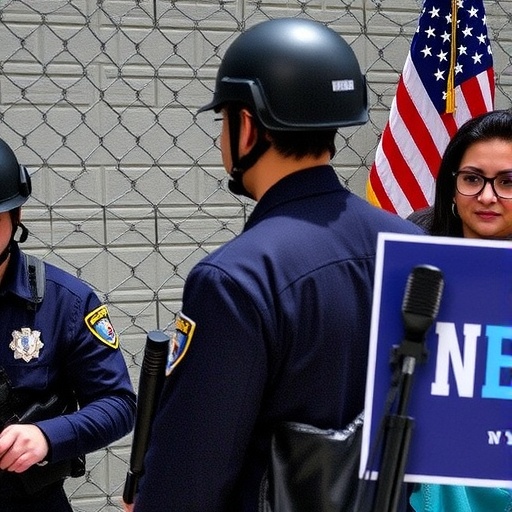Congressional Democrats Launch Investigation into Federal Agents’ Misconduct in Immigration Arrests of American Citizens
In a bold move that’s sending shockwaves through Washington, Democratic lawmakers have kicked off a high-stakes Congressional investigation into allegations of serious misconduct by federal agents during Immigration enforcement operations. Reports of U.S. citizens being wrongfully detained and denied access to legal counsel are at the heart of this probe, raising urgent questions about the erosion of legal rights in the name of border security.
The investigation, announced on Tuesday by a bipartisan but Democrat-led committee, targets systemic issues within agencies like Immigration and Customs Enforcement (ICE) and Customs and Border Protection (CBP). Lawmakers cited a surge in complaints from families torn apart by mistaken arrests, with at least 20 documented cases in the past year alone where American citizens were held for days without Miranda rights or attorney contact. This isn’t just bureaucracy gone wrong—it’s a human rights crisis unfolding in America’s heartland, where the pursuit of immigration enforcement has blurred the lines between legal residents and everyday citizens.
Heartbreaking Stories of Wrongful Detentions Fuel Outrage
At the epicenter of this Congressional investigation are harrowing personal accounts that paint a picture of federal agents overstepping their authority. Take Maria Gonzalez, a 35-year-old born-and-raised Californian whose great-grandparents immigrated from Mexico in the 1920s. Last summer, during a routine traffic stop in Los Angeles, Gonzalez was pulled over for a broken taillight. What followed was a nightmare: ICE agents arrived on scene, mistaking her for an undocumented immigrant based on her surname and appearance. Despite presenting a valid U.S. passport, she was handcuffed and transported to a detention center 200 miles away.
“I begged them to call my lawyer, but they said I didn’t have rights because this was an immigration matter,” Gonzalez recounted in a tearful interview with local news outlets. Her ordeal lasted 48 hours, during which she was interrogated without access to counsel and held in a facility overcrowded with actual deportees. Cases like hers aren’t isolated; according to a recent report from the American Civil Liberties Union (ACLU), over 1,200 U.S. citizens have been erroneously detained by immigration authorities since 2012, with a 30% spike in incidents following tightened border policies under the previous administration.
Another striking example involves Jamal Thompson, a Black veteran from Texas who served two tours in Afghanistan. In 2022, Thompson was arrested at a Dallas airport while returning from a family vacation. Federal agents, acting on a tip about potential smuggling, detained him for 72 hours without verifying his citizenship status. “They treated me like a criminal, not a soldier who fought for this country,” Thompson said during a press conference last month. His story highlights racial profiling concerns, with data from the Department of Homeland Security (DHS) showing that Latino and Black Americans are three times more likely to be flagged in immigration sweeps.
These narratives aren’t just anecdotes—they’re the emotional fuel driving the Congressional investigation. Lawmakers have received over 500 letters from affected families in the last six months, detailing psychological trauma, lost wages, and shattered trust in law enforcement. As Rep. Alexandria Ocasio-Cortez (D-NY), a key proponent of the probe, stated, “When American citizens are stripped of their legal rights in the dead of night, we’re not protecting borders—we’re eroding democracy.”
Federal Agents Under Scrutiny for Procedural Violations
The spotlight in this Congressional investigation is firmly on federal agents’ training and adherence to protocols. Critics argue that ICE and CBP officers, often operating under immense pressure to meet arrest quotas, are bypassing fundamental legal safeguards. A leaked internal DHS memo from 2023 revealed that agents received only four hours of annual training on distinguishing citizens from non-citizens, a fraction of what’s recommended by legal experts.
Statistics underscore the scale of the problem. The Government Accountability Office (GAO) reported in its 2024 audit that 15% of immigration arrests involved individuals later confirmed as U.S. citizens, leading to an estimated $50 million in wrongful detention costs annually. Moreover, access to legal rights remains a flashpoint: under the Immigration and Nationality Act, detainees must be informed of their right to counsel, yet a survey by the National Immigration Law Center found that 40% of those questioned in recent raids claimed they were never read their rights or allowed a phone call.
Sen. Dick Durbin (D-IL), chair of the Senate Judiciary Subcommittee on Immigration, has been vocal about these lapses. “Federal agents are on the front lines of immigration enforcement, but that doesn’t give them a license to ignore the Constitution,” Durbin declared during the announcement hearing. The probe will examine specific incidents, including a controversial raid in Arizona where 15 American citizens were swept up alongside 200 migrants, many held without bail hearings for up to a week.
Whistleblowers within the agencies are adding weight to the allegations. Former ICE agent Carla Ramirez, who resigned in protest last year, testified before a preliminary panel: “We were incentivized to make quick arrests, not verify statuses. Legal rights? That was secondary to the numbers.” Her revelations have prompted calls for reforming the quota system, which ties agent promotions to enforcement metrics—a policy rooted in the 1996 Illegal Immigration Reform and Immigrant Responsibility Act but criticized for encouraging shortcuts.
Lawmakers Push for Reforms to Safeguard Legal Rights
As the Congressional investigation gains momentum, Democratic leaders are coupling scrutiny with actionable reforms to protect legal rights amid escalating immigration tensions. The probe’s framework includes subpoena power to access unredacted agent logs and body camera footage from disputed arrests, aiming to uncover patterns of abuse. Rep. Pramila Jayapal (D-WA), co-sponsor of the resolution, emphasized the need for immediate changes: “We can’t let fear-mongering on immigration trample the rights of American citizens. This investigation is about accountability, not politics.”
Proposed legislative fixes are already circulating. The “Citizens’ Protection Act,” a bill introduced last week by a coalition of 45 Democrats, would mandate real-time citizenship verification tools—like biometric scanners—at all enforcement sites. It also calls for mandatory legal consultations within 24 hours of detention, addressing the current 48-72 hour window that’s often exploited. Supporters point to pilot programs in New York and Illinois, where similar tech reduced wrongful detentions by 25% in the first year.
Contextually, this push comes against a backdrop of heated immigration debates. With border crossings hitting record highs—over 2.4 million encounters in fiscal year 2023, per CBP data—public anxiety has fueled aggressive enforcement. Yet, as immigration experts note, the fallout disproportionately affects communities of color. A study by the Migration Policy Institute revealed that 70% of wrongful arrests occur in urban areas with high immigrant populations, where federal agents rely on local tips that often lack verification.
Stakeholder reactions are mixed. The Fraternal Order of Police, representing many federal agents, defended their members, stating in a release: “Agents risk their lives daily; errors happen in high-stakes environments, but misconduct is the exception, not the rule.” Conversely, advocacy groups like the Southern Poverty Law Center are applauding the probe, with director Margaret Huang warning, “Without swift intervention, these violations could normalize the denial of legal rights for all Americans.”
Broader Ramifications for Immigration Policy and Civil Liberties
The ripples from this Congressional investigation extend far beyond individual cases, challenging the very foundations of U.S. immigration policy. Historians draw parallels to post-9/11 detentions, where over 1,200 Arab and Muslim Americans were held without charge, eroding trust in federal institutions. Today, with immigration remaining a top voter concern—polls from Pew Research show 60% of Americans view it as a critical issue—the probe could reshape enforcement strategies.
Economically, the costs are staggering. Beyond the $50 million in direct expenses, wrongful detentions lead to indirect losses: families report average wage shortfalls of $5,000 per incident, per a Urban Institute analysis. Psychologically, the impact is profound; a 2023 study in the Journal of Immigrant & Refugee Studies found that 65% of affected citizens experience long-term anxiety, with children in these households showing elevated PTSD rates.
Internationally, the scrutiny could strain U.S. credibility. Allies like Canada and the EU have raised concerns about America’s human rights record, especially as global migration surges due to climate and conflict. Domestically, the investigation might bridge partisan divides—while Republicans have historically backed tough immigration stances, figures like Sen. Lindsey Graham (R-SC) have signaled support for citizen protections, tweeting, “No American should fear their own government.”
Looking ahead, the probe’s timeline is aggressive: initial hearings are set for next month, with a full report expected by year’s end. If findings confirm widespread issues, it could trigger DOJ reviews, agent retraining mandates, and even budget cuts to non-compliant agencies. Civil liberties advocates are optimistic, but warn that without bipartisan buy-in, reforms might stall in a divided Congress.
As this investigation unfolds, one thing is clear: the intersection of immigration enforcement and legal rights is a tinderbox. For the Gonzalez and Thompson families—and thousands like them—the quest for justice isn’t abstract; it’s a fight to reclaim the American promise of due process for all citizens, regardless of background.








